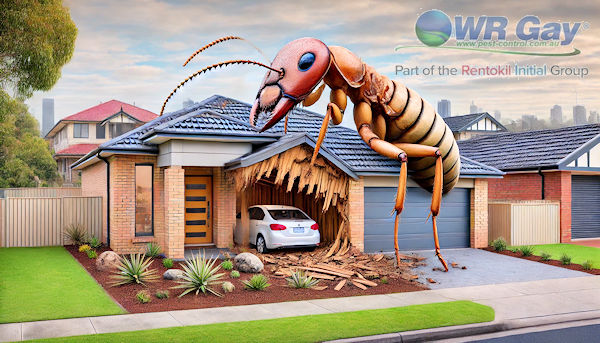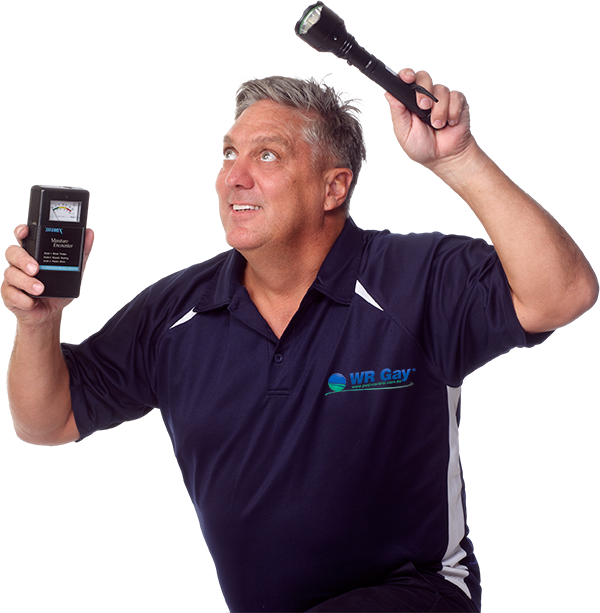Why choose WR Gay for your termite treatment & control?
Today, modern termite/white ant control products are more advanced and successful than ever before. However it still requires specialist skills and extensive experience to get it right and avoid the disasters of selecting the wrong termite treatment method or product to suit your situation. Check out our termite inspection page to read why an annual inspection is crucial.
In all termite control situations, before any treatment is considered, an assessment is conducted to determine exactly the extent of the problem and how or which treatment method or product will be the most suited. Determining the most effective termite or pest control treatment is vital in defending the attack on your home.
- Timber floor specialist
- Treatment are non-hazardous and will not harm “beneficial” organisms in soil
- Appointment times to suit your busy schedule
- All major products and brands available
- Best value and service
- Expert, experienced staff
- Inspection service
- There is no need to vacate the premises
Signs you should book a termite inspection in Melbourne:
 Keeping your home safe from the dangers of termites or other pests is imperative in securing the foundations of your structure. Thankfully, there are key signs you can look out for, in order to determine whether your Melbourne property will benefit from a termite treatment plan. The four most common signs that you have a termite problem are:
Keeping your home safe from the dangers of termites or other pests is imperative in securing the foundations of your structure. Thankfully, there are key signs you can look out for, in order to determine whether your Melbourne property will benefit from a termite treatment plan. The four most common signs that you have a termite problem are:
- Often the first evidence a home owner has that they have a termite or white ant problem is large numbers of winged insects emerging from a door or window architrave or through plaster. These winged Alates, as we call them, are the future termite queens leaving to start new nests elsewhere.
- When damage or hollowing of timbers are detected this is the most common situation where termites/white ants are detected and affect both hard wood and soft wood flooring timbers, architraves, door frames and most other timbers within a building or structure.
- Damage to stored items like boxes of papers or books stored in sub-floor or storage areas are attacked by termites/white ants. Not only is timber a food source for termites but paper and any cellulose material is highly desirable to them as well.
- Mud or dirt appearing in gaps around door jambs or skirtings is often termite/white ant mudding and is associated with their activity, however often there is no detectable damage in the timbers.
The effective termite treatment methods that WR Gay provides are non-hazardous, odourless, and don’t require you to vacate the premises during or after spraying. In most instances the effect of the treatment is instant. We provide our termite control services throughout Melbourne’s suburbs, and are known as the trusted specialist for effective removals. Ensure long-lasting protection for your home with our expert termite removal services, designed to eliminate infestations and prevent future damage.
Should you require any additional information, such as termite treatment cost, or you wish to make an appointment time, please contact us on 1300 761 979.
Termite FAQs
To get rid of termites permanently, engage a professional pest control service. They use specialised treatments like chemical barriers, baiting systems, and direct applications to eliminate colonies. Regular inspections and preventive measures, such as maintaining moisture control and sealing wood, also help prevent reinfestation. DIY methods rarely provide lasting results. Experts recommend a termite inspection every 12 months in Australia. However, high-risk areas or properties with prior termite activity may need inspections every 6 months. Regular inspections ensure early detection and reduce potential damage, saving homeowners significant costs and stress. Treating termites yourself is not recommended. Over-the-counter treatments, such as those from Bunning,s are often ineffective at reaching the colony. Professional exterminators use advanced methods, including bait stations and termiticides, to address the root of the problem. DIY efforts may worsen infestations by disrupting termites and causing them to spread. On a wall, a termite nest may appear as a mud-like tube or mound. It often looks like hardened dirt or mud trails spreading in irregular patterns. If you see such formations, contact a professional immediately to confirm if termites are present. Termites hate sunlight, heat, and dry conditions. They thrive in dark, moist environments. Exposing wood or infested areas to direct sunlight can deter them. Some natural repellents, like neem oil and orange oil, are also disliked by termites, but professional treatments are the most reliable. The most effective termite treatment involves professional-grade termiticides or baiting systems. These target entire colonies, not just surface-level termites. Chemical barriers, such as Termidor, create long-term protection around the home. Combining these with regular inspections ensures lasting control and prevention. Liquid termiticides, such as Termidor, kill termites the fastest. These are applied by professionals directly into soil or infested wood. The chemical transfers through the colony, eliminating it within weeks. While effective, this process requires expert application for thorough results. Do not disturb or attempt to remove termites yourself. This can cause them to scatter and infest other areas. Avoid using DIY treatments, as they often fail to address the root problem. Always consult a licensed pest control service for proper management. Termites are most active during warm and humid months, typically spring and summer in Melbourne. This is when they swarm to establish new colonies. However, they can cause damage year-round. Regular inspections and preventive measures are crucial to managing termite risks. Yes, termites are a significant problem in Melbourne. The city’s climate, combined with moisture from rain, creates ideal conditions for termites. Subterranean termites are especially common, posing a threat to homes and businesses. Regular inspections are vital for Melbourne property owners. Yes, you can spray termiticides around your home’s perimeter to deter termites. However, professional-grade sprays are more effective than DIY products. For long-term prevention, consider chemical barriers or baiting systems, as these offer better protection against infestations. Yes, but it’s not advisable. Termites can cause structural damage over time, weakening your home’s safety. Addressing the problem immediately through professional pest control ensures your living environment remains safe. Neglecting termites can lead to costly repairs and unsafe conditions. Pest control for termites should be repeated every 3 to 5 years, depending on the treatment used. Chemical barriers often last longer, while baiting systems may require regular monitoring. Speak with a pest control professional to determine the best schedule for your property. Termites can cause significant damage within 3 to 5 years, depending on the colony size and structure of the house. In extreme cases, severe damage can occur in as little as 1 year. Regular inspections help detect and mitigate termite activity early.How to get rid of termites permanently?
How often should you get a termite inspection in Melbourne?
Can you treat termites yourself?
What does a termite nest look like on a wall?
What do termites hate the most?
What is the most effective treatment for termites?
What kills termites the fastest?
What should you not do with termites?
What time of year are termites the worst?
Are termites a problem in Melbourne?
Can you spray to keep termites away?
Can you still live in a house with termites?
How frequently should pest control for termites be repeated?
How long does it take for termites to destroy a house in Australia

